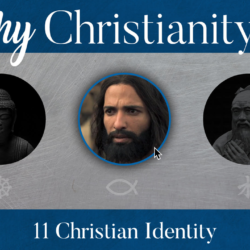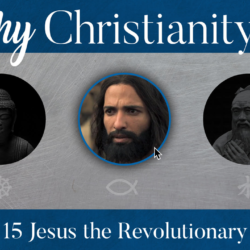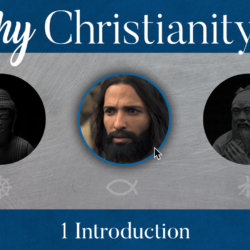This is part 2 of a series of posts called, “Identifying and Subverting Cultural Narratives.” Read part one here.
In my last post, “Seeing the Filter,” I considered how the culture is constantly nudging our sense of normal, scripting and re-scripting what we think will make us safe and happy. The world puts filters over our eyes to color how we perceive everything without us even noticing it. Such deception is so insidious because we really think we can see clearly. We’re all convinced that our take on life is unique and self-derived. However, this is far from true. We are much more like Jell-O than stones.
Over the next several posts, I want to point out some of the filters our culture pushes on us, taking my cue from Tim Keller’s book, Preaching: Communicating Faith in an Age of Skepticism. What I want to cover here is what I call “hyper-individualism” and it typically manifests in two steps.
- self-discovery: Learn what your inmost desires are. Look within yourself at your deepest longings to find the true you.
- self-actualization: Find a way to realize your dreams and reach your full potential. Don’t let external realities stifle you.
Whereas individualism prioritizes individual rights and pursuits before the group’s, hyper-individualism sets the individual against the group. I want to look at two cultural examples to illustrate hyper-individualism before going on to evaluate the idea. First, consider the words to the mega hit “Let it Go” by Robert and Kristen Lopez from the Disney movie, Frozen. Right before this song, Elsa came out or rather was forced out by her sister as someone with ice powers. When this happened an old stodgy character accused her of sorcery. (Later he went so far as to call her a monster.) As she fled, she inadvertently triggered an ice age. She left her old community behind and enjoyed a moment of self-realization alone.
Cultural Example 1: “Let It Go” from Frozen
The snow glows white on the mountain tonight
Not a footprint to be seen
A kingdom of isolation,
And it looks like I’m the queen.The wind is howling like this swirling storm inside
Couldn’t keep it in, heaven knows I tried!Don’t let them in, don’t let them see <<–external repression
Be the good girl you always have to be
Conceal, don’t feel, don’t let them know <<–can’t be who I really am
Well, now they know!Let it go, let it go <<–let who I really am out
Can’t hold it back anymore
Let it go, let it go
Turn away and slam the door!I don’t care
What they’re going to say <<–individual against society in heroic self-expression
Let the storm rage on, <<–don’t care about how my actions affect others
The cold never bothered me anyway!It’s funny how some distance <<–get away to find yourself
Makes everything seem small
And the fears that once controlled me
Can’t get to me at all!It’s time to see what I can do
To test the limits and break through
No right, no wrong, no rules for me I’m free! <<–total self-realization w/ no limits or external morality to stifle herLet it go, let it go
I am one with the wind and sky
Let it go, let it go
You’ll never see me cry! <<–brashness…shame is goneHere I stand
And here I’ll stay <<–I’m out and I’m not changing
Let the storm rage on!My power flurries through the air into the ground
My soul is spiraling in frozen fractals all around
And one thought crystallizes like an icy blast
I’m never going back,
The past is in the past! <<–self-realization is irreversibleLet it go, let it go
And I’ll rise like the break of dawn
Let it go, let it go
That perfect girl is gone! <<–perfection/obedience portrayed as badHere I stand
In the light of day <<–brazen
Let the storm rage on,
The cold never bothered me anyway!
To be clear, I’m not accusing the Lopezes or Disney of igniting some anti-God cultural movement. This song is not about gay pride, school shootings, or adultery; it’s about a snow queen with magical powers. Even so, what makes “Let It Go” so fascinating is how popular it became. It reached the Billboard Hot 100 chart, won an Academy Award for best original song, and earned a Grammy Award for best song written for visual media. This sort of reception occurs when a song connects with the culture. Let me give you one more example before looking more closely at hyper-individualism.
Cultural Example 2: Avicii “Wake Me Up” music video
The first two verses are:
Feeling my way through the darkness
Guided by a beating heart
I can’t tell where the journey will end
But I know where to startThey tell me I’m too young to understand
They say I’m caught up in a dream
Well life will pass me by if I don’t open up my eyes
Well that’s fine by me
In this video, we see how the characters wake up in a repressed, poor, dingy, country hamlet with plain people dressed drably giving them ugly looks. They don’t know why everyone dislikes them. The lead character goes to the city and finds young, happy, stylish, good looking people who have the same identity marker (tattoo) on them. They enjoy music and dance and use technology. After she comes home, she gets her daughter (or sister?) and says she’s found a place where they belong. Like “Let It Go,” this video is not just a minor cultural artifact; it has close to a billion views on YouTube. This music video is not just catchy; it resonates with the culture in a powerful way. People feel repressed, like society is holding them back, keeping them from truly being themselves. External realities should not trump internal longings. If people won’t let you “do you” then you should just move to the city so you can find others with whom you belong.
Other examples of hyper-individualism abound in our world. For example, my Alma Mater, Boston University, uses the motto “be you,” a play on the initials, BU. In other words, come to BU so you can be you. On facebook we often see people declaring to the social universe, “I’m doing this for me.” In other words, I realize others might not like what I’m doing, but I need to do this for myself. One last example is the monomyth or hero’s journey we see played out in movies. The character finds out he or she is somehow different, goes on a journey to discover who they really are, then after facing resistance they self-actualize their latent true self and overcome (usually saving the world in the process), eventually returning to normal society in a new role.
Benefits of Individualism
Although individualism, especially hyper-individualism, has major flaws, it also has worthwhile benefits. For example, in Western culture, many years ago, children generally followed in the footsteps of their parents. Women had very little vocational opportunity apart from raising children and men typically carried on the family business, such as farming, carpentry, or some other trade. Individualism has changed all of this. Nowadays, especially in America, each person believes they should follow their dreams. They can be whoever they want to be. Obviously, this kind of thinking has limitations to it, but it shows the liberating effect of individualism on a society.
Another benefit relates to hypocrisy. During much of the past, people, more or less, all went to church, whether they followed Christ or not. Cultural pressure or even legal requirements ensured that everybody conformed to an external Christian piety. Because of the Protestant Reformation and, in particular, the courageous Anabaptists, church attendance became voluntary. This, I argue, is a good change because it reduces the number of hypocrites. In my own context, upstate New York, a small percentage of people go to church on a regular basis. In fact, the Barna Group labeled my area the most post-Christian city in America. What’s great about that, though, is that people don’t feel such a pressure to fake it. Either they are genuine or they aren’t. They are free to be who they really are religiously.
A third benefit of individualism relates to exceptionally talented people. If everyone merely maintained the status quo or followed in the footsteps of the culture, we would never have had someone like Martin Luther King Jr. His dream for American equality drove him to realize it no matter the cost. Likewise, in the business world for example, we find innovators and dreamers who change how we do things. Technology leaders like Steve Jobs or Elon Musk could never get their start if they weren’t self-motivated enough to defy the naysayers and do what had never been done before. So, individualism can have significant benefits though it has some major detriments as well.
Detriments of Individualism
Here I will just mention two arenas where hyper-individualism erodes society before going on to offer some criticisms of this way of thinking in general. When it comes to marriage, two people come together to make a family unit. Oftentimes people get married to fulfill their own deepest longings for companionship, sex, or having children. They want to find someone who won’t change them, who will be compatible with their tastes, and who will complete them. However, if I enter marriage, solely for selfish reasons, then I am unlikely to stick around when conflict inevitably arises or I cross paths with someone with whom I am more compatible than my present spouse. Such a mindset often leads to relational pain, infidelity, and/or divorce.
Similarly, parenting requires you to subordinate your own desires and longings to the needs of another person. If I have children solely to satisfy my own yearnings then when the children are recalcitrant or don’t live up to my expectations, I will withdraw or even abandon them. Rather than staying relational and disciplining them, I bale because they no longer fulfill me. Sadly, this scenario plays out too frequently today, leaving in its wake psychologically damaged children who instinctively blame themselves rather than recognizing their parents were in the wrong.
Deconstructing Hyper-Individualism
Now that I’ve looked at some of the benefits and detriments of individualism, I want to offer four criticisms of hyper-individualism as a philosophy of life. The first is that basing my identity on my deepest inner longings is unstable because I change over time. Secondly, my desires often conflict with one another. For example, say someone wants to be an astronaut but she also takes delight in long hours of lounging at the beach. Who is she really? Is she a beach bum or an astronaut? How does she choose which passions to pursue? If she loafs around on the beach, she will not put in the countless hours required to get into a good college for aerospace. If she studies relentlessly, she’ll never find the time to make trips to the beach and soak in the rays that satisfy her soul. Furthermore, what if neither is really best for her? What if she doesn’t have what it takes to outperform all the other astronaut candidates and she’s predisposed to have skin cancer? Is she just lost in this case? Has she no meaning in life because there’s no way for her to truly “do her?”
A third problem with hyper-individualism is that our hearts are not very good sources of morality. For example, a serial rapist looks within his heart and finds an overwhelming sense to dominate and defile others. More than any other impulse, this is what brings him true fulfillment. He mentions this self-discovery to a friend who tries to convince him to repress the desire. He says, “You can’t just go rape women. Not only is it wrong to hurt others, but you’ll end up in jail as well.” The rapist replies, “You’re just trying to impose your own sense of morality on me. I’m not like other people; I’m unique. I’ve been stifling this desire for too long. I need to wake up to who I really am let it go. It’s time for me to be me.”
Lastly, hyper-individualism is really just an illusion. Often we have competing desires and we decide which to pursue and which to suppress on the basis of inherited cultural norms. Tim Keller explains:
Imagine an Anglo-Saxon warrior in Britain in AD 800. He has two very strong inner impulses and feelings. One is aggression. He loves to smash and kill people when they show him disrespect. Living in a shame-and-honor culture with its warrior ethic, he will identify with that feeling. He will say to himself, That’s me! That’s who I am! I will express that. The other feeling he senses is same-sex attraction. To that he will say, That’s not me. I will control and suppress that impulse. Now imagine a young man walking around Manhattan today. He has the same two inward impulses, both equally strong, both difficult to control. What will he say? He will look at the aggression and think, This is not who I want to be, and will seek deliverance in therapy and anger-management programs. He will look at his sexual desire, however, and conclude, That is who I am.
So, if the whole premise of hyper-individualism is for me to “be me” and yet I choose which me to be on the basis of socially constructed ideals I’ve inherited from the culture, then in reality I’m merely conforming to my culture. I think I’m being radical and I’m totally unique, but I’m really just picking which longings to amplify or suppress based on the culture. I might think I’m free, but I’m just another deluded slave to environment.
A Christian Perspective
My last criticism of this way of thinking is that it flatly contradicts what scripture says. Our moral compasses rarely point to true north. Here’s what Jeremiah says:
Jeremiah 17.7-10
Blessed is the man who trusts in the LORD, whose trust is the LORD. He is like a tree planted by water, that sends out its roots by the stream, and does not fear when heat comes, for its leaves remain green, and is not anxious in the year of drought, for it does not cease to bear fruit. The heart is deceitful above all things, and desperately sick; who can understand it? I the LORD search the heart and test the mind, to give every man according to his ways, according to the fruit of his deeds.
We can either trust in God and enjoy the stability that results from having a reliable external source or we can look within to our hearts which are both maximally deceitful and desperately sick. It is not heroic to give in to your lusts; it’s just weakness masquerading as courage. If we give in to our fleshly passions we lose true freedom and end up slaves to sin. Paul writes:
Romans 6.12-13
Let not sin therefore reign in your mortal body, to make you obey its passions. Do not present your members to sin as instruments for unrighteousness, but present yourselves to God as those who have been brought from death to life, and your members to God as instruments for righteousness.
From a Christian perspective, sin is not merely some external force, but something deceptive and internal. Even so, that doesn’t mean every thought that pops into our heads is evil. That’s precisely the problem. Sometimes my heart urges me toward kindness and other times vengeance. As a result of all this inner confusion, we need an external guide to help us. But, so long as we pick and choose which aspects of what God says to obey and which to ignore we are still piloting our lives based on our inner desires. The only way to truly liberate ourselves from the deceptiveness of sins is to subordinate our own will to God’s. This is why Jesus would tell those interested in following him to deny themselves and take up their crosses (Luke 9.23-24). As Jesus completely submitted to God’s will, he calls us to do the same. When we obey God’s agent, Jesus, we find deliverance from our depraved instincts and empowerment to act on the good through the indwelling of God’s spirit.
Adopting such a submissive mindset towards God sounds awfully stifling and scary. How can we be sure God is trustworthy? How can we be sure God genuinely has our good at heart? How do I know he won’t take advantage of me or abuse that level of trust? These are worthwhile questions to wrestle with for each of us. What we often do when trying to determine if someone will be trustworthy is to look at his or her track record. When we examine God’s dealings with humanity we find an exceedingly patient individual who loves us and longs to have a relationship with us. The cross, in particular, best demonstrates God’s love for us. He allowed his son, his only begotten son, to die for us. He’s given everything for us. He is worthy of our trust.
Conclusion:
We need an external accurate perspective to help us sift and filter what our hearts are telling us. Without such guidance, we are like dinner guests, dressed in our finest, thinking we have made it to the pinnacle of self-realization, without realizing the mighty ship we stand upon is the Titanic. If God made us, then it makes sense that he would have the best perspective on how to live, just like an inventor best knows how an invention should work. Can you trust him? Will you trust him? You will become your greatest you by repressing those inner longings that he says are wrong and amplifying those he says are right.
Check out part three of this series: Tolerance.








Here’s an interesting NY Times article on hyper-individualism and why being authentic may not be the best advice.
I am one of those who psychologist label schizophrenic. My brain chemistry has an imbalance or so they say. I can’t connect emotionally to people, I don’t feel anything toward them, I can’t generate empathy toward them. This presents a problem for me in that I have to take the scriptures for what they are or say. I do not feel anything toward God or Christ because for one they do not interact with me. They don’t talk to me, I don’t see them nor feel them. Invisible people or beings are of no help to me, so I read scripture as guideline for my behavior. I have impulses [mainly violence] that I used to just act on like your hyper-individualism examples but I don’t any more because scripture says hey, you can’t do those things. Basing ones actions and behavior on scripture principles I find is a better route than just going with the flow of ones heart and a lot less hassle in the end.